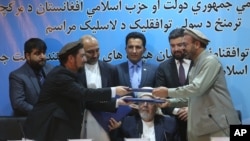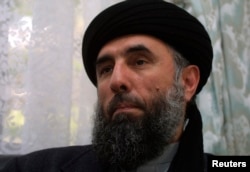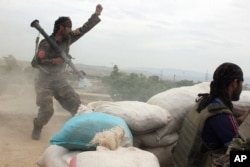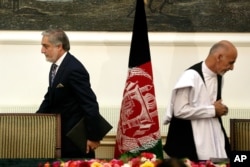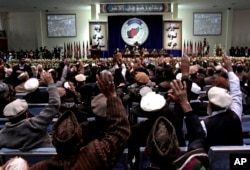Afghan President Ashraf Ghani has formally signed and put into force a much-touted peace pact with an ethnic Pashtun warlord who has been designated a “global terrorist” by the United States.
Thursday’s landmark move coincided with the two-year anniversary of the coalition government which has been subject to widespread criticism of its handling of the critical economic, political and security challenges facing Afghanistan.
The fugitive warlord, Gulbuddin Hekmatyar, addressed the signing ceremony held at the presidential place in Kabul through a specially arranged video link. He signed the peace treaty on behalf of his Hezb-i-Islami-Gulbuddin (HIG) faction.
President Ghani put his initials on the document as millions of Afghans watched the historic event live on television.
Ghani’s election-rival-turned governing partner, Chief Executive Abdullah Abdullah, former president Hamid Karzai, lawmakers, prominent jihadi commanders and foreign diplomats were among hundreds of attendees at the event.
In his speech. Hekmatyar urged the government to open peace talks with the Taliban and called on the Islamist insurgency to end fighting and join the peace process.
“War is not the way out. We can reach our political goals through peace and reconciliation,” said the warlord with a history of war crimes and human rights abuses allegedly committed during the civil war of the 1990s.
Ghani and Abdullah, in separate addresses to the gathering, said the agreement has ensured protection of all constitutional rights of Afghans.
“The peace deal is line with and centered around the constitution of Afghanistan. There is no article in the document we have signed that is in conflict with the Afghan constitution,”said the Afghan president, asserting the document was finalized with the backing of a national consensus.
“It is now time for the Taliban to think about whether they want to continue the war, or come to the table for peace talks,” Ghani added.
The peace deal means the immediate cessation of hostilities by Hekmatyar’s fighters. In exchange, the government will be obliged to grant full political rights to his group and work for the removal of U.S. and U.N. sanctions against the warlord and his companions to enable them to stage a political comeback after years in hiding.
The agreement is the first significant step towards seeking a peaceful settlement of the Afghan war, now in its 15th year.
Taliban fight goes on
However, critics see the peace deal as a largely symbolic victory for President Ghani because Hekmatyar’s group enjoys influence in very few of the 34 Afghan provinces as compared to the Taliban. Some of his comrades are known to have directly or indirectly joined the national politic process over the years after parting ways with the group.
Skeptics warn against attaching too much hope to peace with the insurgent warlord, who has lived in hiding in neighboring Pakistan and Iran, though his aides say Hekmatyar spoke to Thursday's ceremony from a hideout inside Afghanistan.
“It is difficult to imagine that Hekmatyar, who until a few months ago was one day courting the Taliban, and another day al-Qaida, would undergo a sudden personality makeover, unless he felt that he has reached the end of the militant path he started on 40 years ago,” noted Omar Samad, a former Afghan diplomat.
“Apologizing to the nation for past crimes - in his case going back to a few months ago – is the most sensible minimal response for all those involved in obvious past atrocities going back to 1978.”
The reconciliation with the HIG faction comes as the Taliban has intensified battlefield attacks across Afghanistan and made significant territorial gains, inflicting heavy casualties on Afghan security forces.
The Islamist insurgent group has condemned Hekmatyar for entering into the deal with Kabul and has not indicated whether it is willing to quit violence and engage in peace talks with the government.
The bottom line though is that the Taliban has utterly no incentive to join peace talks,” said Michael Kugelman at Washington’s Woodrow Wilson Center.
“It’s scoring many battlefield achievements, so stepping off the battlefield simply doesn’t make sense. The Taliban essentially has a why-quit-when-you’re-ahead argument here, and it’s a potent one.”
Human rights concerns
Human rights groups and liberal Afghans have deplored the return of Hekmatyar. They continue to blame him for mass casualties his fighters inflicted on civilians during the civil war. But some also point to the presence in the current government of warlords with similar past records who serve with impunity.
The United States designated Hekmatyar a global terrorist in 2003, accusing him of facilitating al-Qaida-plotted attacks against Americans and asked the U.N. to include him on its list of known terrorists.
The United Nations and Washington have welcomed the deal with Hekmatyar. Afghan officials insist they have been assured by their international partners they will help to remove his name from the blacklist.
Critics have called for Ghani and Abdullah to ease internal political confrontations they are currently locked to better address deteriorating security conditions in the country and encourage other armed groups, including the Taliban, to join Afghan peace efforts.
Afghan leaders, however, allege sanctuaries in neighboring Pakistan are helping sustain the Taliban insurgency, and accuse Islamabad of not helping to address the problem.
Kabul infighting
Weeks before the second anniversary of their national unity government (NUG), Abdullah and Ghani went public with their simmering disputes, accusing each other of blocking reforms, fueling political uncertainty.
“Political infighting has stalled progress on the NUG’s reform agenda, and increasingly we’re seeing the ANSF (Afghan National Security Forces) fail to take adequate measures to protect civilians," observed Patricia Gossman, senior Afghanistan researcher at Human Rights Watch.
"No progress on the action plan on torture, continuing impunity, and little progress on women’s rights. It’s not what President Ghani promised,” she said.
Both the leaders, however, maintain they are working together to address mutual concerns and dismiss suggestions of a political crisis griping Afghanistan.
“Short of a dramatic upheaval, there is no quasi-legitimate alternative to the unity government. No other prescription can, at this juncture, deal with Afghanistan’s multi-prong challenges,” Samad asserted.
Analyst Kugelman said that daunting security, economic and security challenges demand a close working relationship between Ghani and Abdullah.
“My sense is that both leaders have made genuine efforts to tackle Afghanistan’s most critical challenges. Corruption is one area where Ghani has really made some progress. The problem is that both leaders haven’t been working together on these challenges, due to either disagreements on how to address them or to their simply not being in a position to work together,” he said.
A U.S.-mediated power-sharing political deal between Ghani and Abdullah to stave off political violence after the controversial 2014 presidential vote, paved the way for the election rivals to form NUG with Ghani as the president and Abdullah as the head of the newly created office of the Chief Executive.
The political deal required the unity government to organize by its second anniversary a mandatory convention of national and provincial lawmakers to decide whether to amend the constitution to elevate Abdullah to be the executive prime minister of Afghanistan.
In the absence of promised electoral reforms, elections to national and provincial legislatures could not be held in time to convene the promised constitutional Loya Jirga (Grand Assembly) at the culmination of the second anniversary of the government.
The lack of progress has raised questions about the legitimacy of the NUG, particularly of the chief executive’s office and decisions taken by Abdullah.
Both the Afghan leaders and Washington in the run up to the second anniversary dismissed those concerns, saying the government will complete its five-year mandatory constitutional term regardless of whether the Loya Jirga is held or not.




